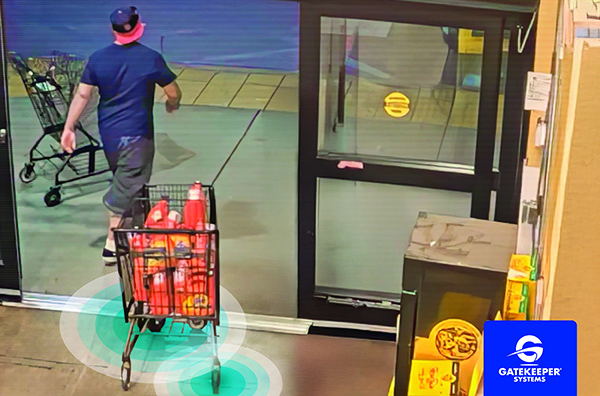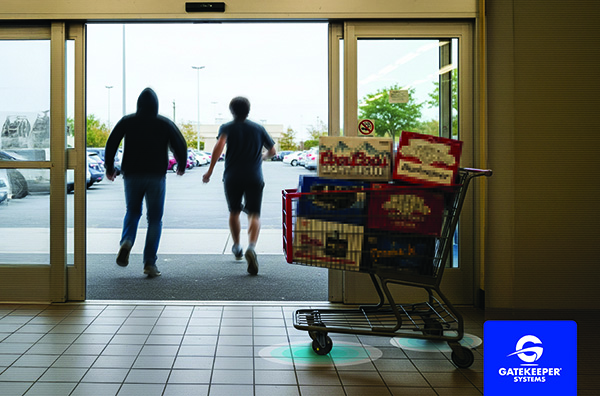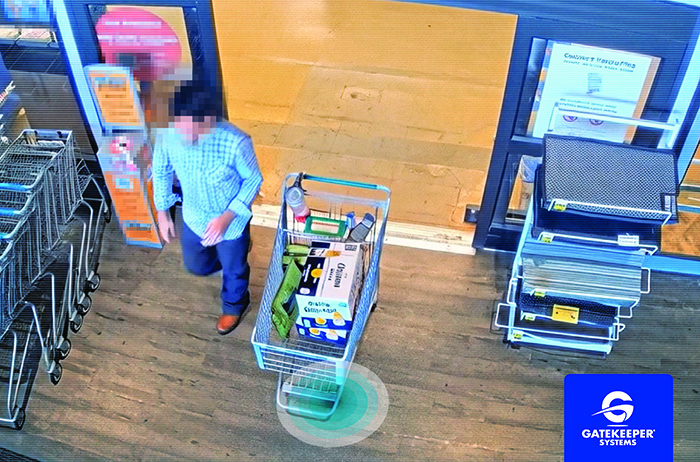
Your store is busy.
A cart loaded with merchandise rolls past checkout – calm, confident, no hesitation.
Gone.
What used to be rare is now disturbingly routine for many grocers.
Pushout Theft on the Rise
Pushout theft – when unpaid merchandise is wheeled straight out the front doors – is one of the fastest-growing loss categories in retail.
“All grocers are at risk. Pushout theft is real and is a major vehicle for Organized Retail Crime. Regional grocers cannot afford to underestimate the seriousness.”
— Loss Prevention Foundation President Caroline Kochman
High-demand items like meat, baby formula and health and beauty products are frequent targets. The speed and simplicity of this crime make it difficult to stop without the right deterrents.
According to PushoutTheftNewsCenter.com, which tracks and analyzes U.S. news stories involving shopping cart thefts, the national average reported in 2024 was $1,112 per incident. Many involved multiple carts of merchandise. This figure reflects the extremes – what makes the news – but illustrates how quickly losses can add up.
This isn’t petty shoplifting. In many cases, it’s organized, deliberate, and repeat behavior—and the scope of Organized Retail Crime is drawing national attention. Lawmakers and attorneys general have urged swift federal action, and hearings in Congress have made ORC a priority issue.
David Johnston, VP of asset protection and retail operations at the National Retail Federation, reinforced that urgency in his testimony: “We need government at every level to take actions that curtail the ability and opportunity for these criminal organizations to profit from stolen merchandise, and to send the signal that this type of criminal activity will no longer be tolerated.”

Why It’s Happening More Often
- Economic Pressure: Inflation and job insecurity push some toward theft – either for resale or basic needs.
- Ease of Resale: Online marketplaces and social media make it easy to turn stolen goods into quick cash.
- Low Risk: Weak penalties and limited law enforcement resources mean many bad actors face few consequences.
- Operational Strain: Short staffing leaves fewer eyes on exits and fewer hands to respond in the moment.
Opportunistic pushout theft often looks completely ordinary – a typical cart, filled with typical merchandise, pushed by someone who blends in with other shoppers – making it harder to detect in real time. Pushout theft is a tool used by both ORC rings and opportunistic shoplifters.
The Real Cost
For grocers, the impact goes beyond the lost merchandise:
- Margins: Every pushout is a direct profit hit, eroding already thin margins.
- Safety: Employees are often told not to engage, leaving them powerless against bad actors.
- Customer Confidence: Seeing unchecked theft can make shoppers question store safety and brand integrity.
And for regional grocers, there’s another reality: when national chains deploy advanced prevention technology, the problem doesn’t disappear – it moves. An industry partner noted that after deploying Purchek in high-theft stores, incidents dropped sharply and repeat offenders often stopped returning. But the crime didn’t vanish – it shifted to other locations without similar protection.
When Traditional Methods Aren’t Enough
Cameras, exit monitors and vigilant employees are still important – but they’re reactive. By the time a bad actor is spotted, the cart may already be in the parking lot.
“In my years leading loss prevention for a major national retail chain, I’ve never seen a single solution deliver as immediate and measurable an impact on shrink as Gatekeeper Systems’ Purchek solution,” said Mark Stinde, loss prevention executive. “The ROI was both meaningful and sustained, proving its value far beyond the initial deployment.”

How the Purchek Solution Works
The Purchek solution uses discreet SmartWheel technology which communicates with a simple network of strategically placed sensors. If a cart attempts to exit without payment, the wheels lock – stopping the bad actor without confrontation.
It works quietly in the background, allowing store teams to focus on customers rather than suspects. And for grocers already using Gatekeeper Systems’ CartControl technology to retain carts in the parking lot, adding the Purchek solution is straightforward and doesn’t require a long, costly installation.
Proof in the Field
At Dierbergs Markets in St. Louis, the results were immediate.
“Gatekeeper’s Purchek solution has been a game-changer in reducing pushout theft,” said Tim Larouere. “The measurable results and strong support from their team have made a real difference in our operations. From implementation to ongoing service, their support has been exceptional, making them a trusted resource for our operations.”
For regional grocers facing tighter budgets and leaner teams, that kind of partnership matters. It’s not just about the hardware – it’s about having a responsive, knowledgeable team behind it.

Beyond Theft Prevention
The benefits of the Purchek solution don’t stop at stopping carts.
When coupled with event-triggered video, the Purchek solution captures a record of attempted thefts, which can support investigations, provide evidence, inform training and guide operational changes. Over time, these insights help grocers adapt layouts, adjust staffing and make smarter decisions about where and how theft is most likely to occur.
Better data means better prevention – and safer stores.
The Bottom Line
Pushout theft isn’t going away. It’s evolving.
The question isn’t if it will happen in your store, but when.
Grocers who act now – by combining deterrence with data – can protect their people, products, and profits.
So, if this happened in your store today, could you stop it?
With Gatekeeper Systems’ Purchek solution, many can confidently answer:
Yes, we stopped it.
Purchek, CartControl and SmartWheel are registered trademarks of Gatekeeper Systems Inc.


